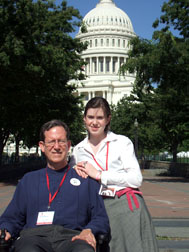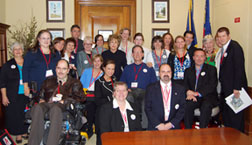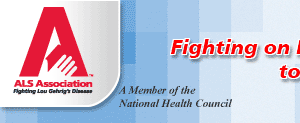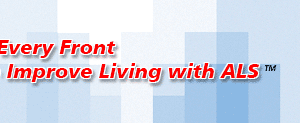|
October 29, 2008 Teen, Whose Dad has ALS, Offers
Personal Look into Advocacy Day
By Gary Wosk, Staff Writer
Years from now, Catherine Swift, who soon will turn 15, her sister Emma, 18, and other young people with parents who have ALS, will be able to describe to their children and grandchildren how their efforts helped people fighting Lou Gehrig’s Disease and, hopefully, resulted in a cure.
Swift, a resident of Henderson, N.C., also will inspire future generations by pointing to the powerful article she wrote about traveling to Washington, D.C., in May 2008 with her dad, the Rev. Tom Swift, who has ALS ─ and participating in The ALS Association’s National ALS Advocacy Day and Public Policy Conference, something she will always cherish.
 |
|
Catherine Swift and her dad, the Rev. Tom Swift, on Capitol Hill last May. | As a hospice chaplain with CareParnters Hospice and Palliative Care in Asheville, N.C., and an advocate for The Association, Tom Swift has been offering comfort and support to those facing death for many years. Even after the disease made speaking difficult, the well-known reverend accepted community invitations to talk about his experience living with the disease.
Catherine, who has inherited at least his knack for caring, writing and other positive qualities, values every moment she has left with her dad.
A ninth-grader who attends West Henderson High School, where she writes for the campus newspaper, is involved in student government, theater and service clubs, Catherine was a last minute replacement for the Advocacy Day trip because her sister had to stay home and take high school exams. As it turned out, the three-day experience marked a turning point in young Catherine’s life.
“The realization that I am doing something to help others with ALS really helped me feel better,” said Catherine, one day hoping to join the Peace Corps and to become a fulltime writer.
Catherine joined a large constituency from The Association’s Jim “Catfish” Hunter Chapter at Advocacy Day. She spoke to members of Congress about providing care to her 50-year-old dad, diagnosed with ALS in 2007.
In her article, she reflects on such subjects as helping Tom during Advocacy Day and how nervous she was about the prospect of addressing elected federal officials, what she told them and shares these and other insights about the annual event.
“The article is mainly about how blessed I felt to have that experience, I was really glad to get the chance to spend time with my dad but also to fight ALS,” she said. “I also learned that from my dad that even though ALS is awful, there are definitely good things that can come from it. He and I are growing and learning. We want to touch others, reach out to them and share what we know.”
The following article was published in the Sunday edition of the Asheville Citizen Times last summer will soon appear in the chapter’s newsletter.
|
“Waiting to step into impressive buildings in your nation’s capitol to plead your case directly with those who govern the most powerful country in the world at age fourteen can be compared to waiting to sit down to a philosophical discussion with Plato, Aristotle, and Socrates before you’ve started kindergarten. It’s scary, and frankly, you just don’t feel prepared. Maybe, if you are like me, you’ve experienced the first, and maybe, if you have a very vivid imagination, you’ve also experienced the second. But if you’ve experienced neither, as scary as they can be at first, I encourage you to try at least the first one out.
I did so for the first and so far only time this past May, which is National ALS Awareness Month. My father, Tom Swift, was diagnosed with ALS over a year ago, and he invited me to accompany him to Washington D.C. this year for National ALS Advocacy Day. This day is in the center of a weekend in which chapters like the Jim "Catfish" Hunter Chapter of North Carolina from all over the country meet to travel to Capitol Hill in order to inform Congress men and women about the need to take action against ALS. Of course I was thrilled to go and spend time with my dad, though I was nervous, because I knew I was going partly to help him with things such as pushing his wheelchair and cutting some of his food, things which I do often at home but that are much more challenging in airports and large cities. Actually, I wasn’t just nervous. I was scared. But as the saying goes, things are not always what they seem.
When we arrived in D.C., things were going as I expected. My dad and I were having a great time together, but even getting from place to place was a constant challenge for me. Not only was I faced with the anxiety of helping my dad into cabs and forcing his wheelchair into the trunk, but the whole idea of riding in taxi cabs was new to me. Sure, I’d seen it on TV, but had I done it? Never. But then, on Sunday afternoon, things changed.
After lunch, my dad and I made our way down to the lower floors of the Renaissance Hotel where we were staying with all of the other ALS advocates, and we met them for the first time. For me, though I knew none of the hundred plus people there, if felt exactly like coming home after a long day to the most supportive family in the world. Never before had I met anyone else with ALS, let alone anyone who was in my position, a family member who had to deal with not just the physical hardships but the often excruciating emotional burdens of loving someone trapped by this awful disease. And here were more people than I could count, all of whom shared my experiences, my pain, and my passion to fight ALS. At first I couldn’t breathe, I was so ecstatic and relieved. And it only got better.
At Capitol Hill two days later, I realized several things. I realized that “wear comfortable walking shoes” means “WEAR COMFORTABLE WALKING SHOES!” I realized that despite the intimidating titles, senators and representatives were real people who really do care. I realized that, as overused as the expression is, a small group of people actually can make a difference. And most importantly of all, I realized that I was not just in Washington, D.C. with my father to help him get around. I was there to help him tell his ALS story and bring the disease to and end. I was there to fight. And so fight I did.
That day I stood up in front of two senators and three representatives, and I told them, more or less, how I felt. I told them what it was like to have a parent with ALS. How I was angry, sad, confused, afraid. How I didn’t know if he’d be there when I got married. How I didn’t even know if he’d be there when I graduated from high school. How I prayed until it hurt that there was hope, that there was a cure. I told them all of this, and I told them that that hope would not exist without their help. And they listened.
None of this was anything I ever expected to do. None of this I ever expected I could do. But I did, and everyday I am grateful that I did, that I got this chance to fight not only for myself and my father, but for everyone that I met on that trip who was affected by ALS, and also for everyone I haven’t met that only wants what I do: hope. After ALS Advocacy Day, I believe that it is there. We just have to reach for it.” |
In each of the past two years, The Association has held breakout sessions during the Advocacy Conference designed specifically for younger advocates, like Catherine, and their families. The session, Advocacy for Children and Families, helps to relieve the fears many younger advocates may have about sharing their experiences. It educates them about the important role they can play and gives them the tools to actively participate in the fight for a treatment both in Washington, D.C., and in their hometowns throughout the year. The session has become among the most popular of the conference, and last year it was sold out ─ filling the room beyond capacity.
“Some of The ALS Association’s most important foot soldiers in the battle to defeat ALS are children and teen-agers,” said Gary A. Leo, the president and CEO of The Association. “They are just as passionate in trying to solve the mystery that is ALS as the adults.”
 |
| The entire Jim “Catfish’ Hunter Chapter met with North Carolina Sen. Elizabeth Dole (center, black dress) last May, including Catherne Swift, to her left, and her dad, the Rev. Tom Swift, (dark blue shirt). | “Getting children and families involved is vital,” said Steve Gibson, The Association’s vice president of government relations and public affairs. “Not just because all of us can make a difference, but because members of Congress need to know this is a family disease. It impacts everyone it touches, not just the person diagnosed.”
It is estimated that 30,000 people in the United States are living with ALS; however the lives tens of thousands more, including family and friends, many of them children, will forever be altered. Still, Catherine finds the time to engage in everyday teen-age activities.
“Absolutely,” she said. “It is important to my dad that I carry on with my life, and it is important to me, too. I am doing everything that I want to do and a lot of that is being with my dad; it is one of my favorite things to do.”
As for her dad, whose passions in life include writing, kayaking, backpacking, hiking, creating stained glass, learning star constellations, and coming to his younger daughter’s English class to discuss the book, “Tuesdays with Morrie,” Catherine shares, “He loves to write, being with friends, with me and my sister, and enjoying the beauty of the world. |



